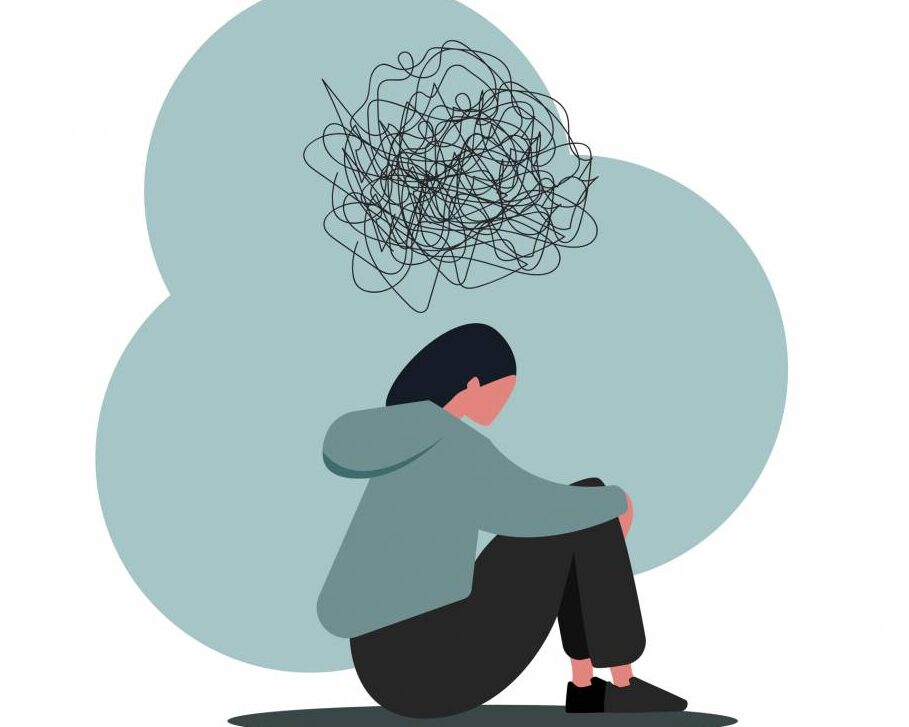Your cart is currently empty!

“Leveling Up: The Anxiety Cheat Codes Every Millennial Needs To Hear”
Posted by:
|
On:
|
Okay, let’s be real: between perfect Instagram pics and constant hustle culture, our lives are anything but the chill vibes we try to project. For loads of us millennials, this constant grind to keep up—in our jobs, social scenes, or even our downtime—is legitimately exhausting. No surprise, then, that anxiety is practically a plus-one at this party.
Growing up in such a fast-changing world, we’ve seen it all: from recession vibes to tech booms, and now, looming environmental meltdowns. It’s a lot. And it’s not just the big stuff; it’s the daily pressure to excel in all areas, turning us all into perfectionists after that ‘can’t stop, won’t stop’ mantra.
So, what’s this post all about? It’s time to spill the tea on anxiety—breaking down what it’s really like and why it’s so tangled up in our millennial DNA. We’re here to chat, spill truths, and find ways to deal with our collective frenemy: anxiety.
Getting why anxiety hits us like a ton of bricks is key before we can even think about dodging those bricks, right? Here’s the scoop: diving deep into what makes our anxiety tick is like unlocking the ultimate cheat code. Think of it this way: if your phone starts glitching, you don’t just chuck it, right? Nah fam, you figure out what’s up. Maybe it’s too many apps open, or it just needs a reboot. Understanding anxiety is kinda the same deal—it’s about peeping the problem, so we’re not just reacting on the fly but actually getting proactive about our mental health game. It’s all about turning those ‘oh no’ moments into ‘I got this’ strategies.
So let’s talk about the constant buzz in our brains. Anxiety. Yeah, it’s almost a rite of passage at this point, right? Back in college, I remember sitting in the library, coffee in hand, heart racing like I’d just run a marathon. Except, I hadn’t moved from my chair in hours. I was just trying to finish a term paper. Normal, huh? It seemed like everyone around me was in the same jittery boat, swapping stories about sleepless nights and endless worry lists as casually as we traded Netflix recommendations. It wasn’t just the stress of deadlines; it was like our brains were stuck in overdrive. And now, scrolling through my feeds, it’s clear we’re not out of those woods yet. Turns out, anxiety didn’t graduate with us—it kinda moved in. So, how do we deal? Stick around, because understanding this beast is step one to taming it.
What is Anxiety?
Okay, so what exactly is anxiety in the world of psychology? Think of it as your brain’s alarm system—but sometimes, it’s a little too eager. It’s supposed to alert you when there’s actual danger, like helping you slam the brakes if a car suddenly stops in front of you. Super useful, right? But for those with anxiety, it’s like this alarm goes off during a false fire drill… over and over. Psychologically speaking, anxiety is a response to stress that sticks around longer than needed, often cranking up the intensity. It can make you expect disasters around every corner, turning everyday situations into stress tests. So, when we talk about managing anxiety, we’re really trying to get that overactive alarm to RELAX and only sound off when there’s real trouble, not just because your phone died or you got left on read.
What if I’m just stressed?
Alright, let’s break it down: stress vs. anxiety. We all get stressed, right? Deadlines, interviews, maybe your Wi-Fi cuts out in the middle of a streaming binge—totally normal. Stress pops up, hangs out with us for a bit when we’re dealing with tough or annoying stuff, and then it usually bounces when the situation cools down.
Anxiety, though? It’s like that clingy friend who doesn’t know when to leave the party. It often sticks around way longer than it should, turning up even when there’s no obvious reason. Anxiety disorders crank things up a notch. Imagine feeling that on-edge vibe from stress, but it’s on replay, affecting your day-to-day life, making you worry about things way before they happen, or even about things that might never happen. It’s like your brain is on a constant loop of ‘what ifs.’
So, while stress is like a short-term guest reacting to a specific situation, anxiety can be more like an unwanted roommate, often overstaying its welcome and making everything more complicated than it needs to be.”

Common Symptoms
Feeling anxious? Here’s a quick rundown of what that might look like. Whether you’re experiencing some of these symptoms occasionally or they’re a regular party in your mind and body, understanding them is the first step to getting a handle on things.
Physical Symptoms:
- Heart Racing: Like you just sprinted to catch the bus.
- Sweating: And not just because it’s a hot day.
- Trembling: Feeling shaky like you’re on your third espresso.
- Headaches: That annoying ache that just won’t quit.
- Stomach Issues: When your gut decides to mimic a rollercoaster.
Emotional Symptoms:
- Irritability: When even your phone’s ping starts to annoy you.
- Feelings of Dread: Like something bad is always just around the corner.
- Restlessness: When you feel like you can’t sit still or relax.
- Panic: Those intense moments of fear that hit you out of nowhere.
Cognitive Symptoms:
- Racing Thoughts: Your brain’s like a browser with 100 tabs open.
- Incessant Worry: Worrying about stuff that’s way out of your control.
- Indecisiveness: Even choosing what to eat becomes a dilemma.
- Forgetfulness: Walking into a room and forgetting why you’re there.
If you’re nodding along to these, know that you’re not alone. Each one is a common sign that anxiety might be at the wheel, and recognizing them is your first cue to start taking back the control.”
Causes and Triggers
Ever wonder why some of us are more prone to anxiety than others? Well, it’s kind of a mixed bag of tricks that life throws at us—some we’re born with, and others just happen along the way. Let’s unpack this suitcase a bit:
Genetics: Sometimes, anxiety runs in the fam like that one awkward holiday sweater everyone ends up wearing. If your parents or siblings deal with anxiety, there’s a chance you might pick up that baton too.
Environmental Factors: Growing up in a chaotic or high-stress environment can be like setting the stage for anxiety. It’s like if you learned to ride a bike in a hurricane—you’re going to be a bit more on edge, right?
Personal Life Events: Big life changes—even the good ones like landing a dream job or moving to a cool new city—can bring on anxiety. It’s like, “Yay, but also, yikes!”
And then, there are those everyday triggers:
Public Speaking: Standing up in front of a crowd can make your stomach do flips, and not the fun kind. It’s like suddenly you’re a lead singer, but forgot all the lyrics.
Financial Worries: Money issues can make anyone’s anxiety spike. It’s like every time your bank app notification pops up, your heart drops.
Significant Life Changes: Things like graduating, starting a new job, or even breaking up can shake up your world and stir up anxiety. It’s the emotional equivalent of trying to stand still on a moving train.
Recognizing what flips your anxiety switch is key. Once you know, you can start crafting a game plan to keep those nerves in check.

Impact of Ignoring Anxiety
Letting anxiety run wild without checking in can lead to some not-so-great outcomes. Think of it as ignoring a ‘check engine’ light on your car’s dashboard—it’s not just going to go away, and things might just get messier. Here’s what could go down:
Relationship Drama: When you’re always on edge, it’s easy to snap at friends or bail on plans last minute. Pretty soon, your go-to Netflix buddy might start hitting pause on invites.
Work Woes: Ever tried focusing on a task when your mind is hosting a worry party? It doesn’t end well. That unchecked anxiety can mean missed deadlines, spacey meetings, and maybe even some awkward chats with your boss.
Health Hiccups: Constant stress and anxiety don’t just mess with your mind; they play rough with your body too. Hello, insomnia, headaches, and a side of digestion drama.
Mood Rollercoaster: Think mood swings that could rival any soap opera drama. One minute you’re up, the next you’re way down, and it’s not just tough on you—it’s confusing for everyone around too.
Turning to Unhealthy Coping Mechanisms: When the anxiety gets too much, it’s tempting to reach for quick fixes like one too many drinks, binge eating, or zoning out for hours on social media. Spoiler: these usually make things worse in the long run. So yeah, it’s worth tuning in and dealing with anxiety before it turns up the volume on other areas of your life. Taking control early helps keep the peace—both in your head and your life.
Strategies to Manage Anxiety
Got anxiety cranking up the volume in your head? Let’s hit the mute button with some DIY techniques. And remember, it’s totally cool to call in the pros when things get too real.
Breathe Deep: Sounds simple, but deep breathing is like hitting the reset button on your stress levels. Try the 4-7-8 technique: breathe in for 4 seconds, hold it for 7, and exhale for 8. It’s like a mini spa session for your nervous system.
Move Your Body: Whether it’s yoga, a quick jog, or just dancing around your living room, getting active can help shake off some of that anxiety. Think of it as chasing those jitters away with every step.
Write It Down: Got a mind full of worry marbles? Dump them out on paper. Journaling can help you declutter your thoughts and spot anxiety patterns. Plus, it’s a great excuse to buy fun journals/workbooks. My favorite is this one here.
Mindfulness and Meditation: Tune into the now. Apps like Headspace or Calm can guide you into meditation, helping you anchor in the present moment, away from the ‘what ifs.’
When to Call in the Pros: If your anxiety is more like a constant background noise that won’t fade, or if it’s getting in the way of your daily stuff—like work, relationships, or just feeling okay—it might be time to team up with a therapist. They’re like personal trainers for your mental health, helping you develop stronger coping skills and getting to the root of your anxiety.
Remember, it’s totally normal and okay to seek help. Just like you’d see a doc for a relentless cough, seeing a mental health professional for persistent anxiety is smart self-care.
So, why bother understanding all the ins and outs of anxiety? Well, because knowledge is power, right? Getting to grips with what anxiety really is and recognizing how it shows up for you is the first step toward not letting it run the show. It’s like being the director of your own life movie—you get to call the shots, not your anxiety.
Start by tuning into your own experiences. Notice when and why you feel anxious. Is it during work meetings? Late at night? Understanding your triggers can help you prepare better responses, kinda like having an umbrella ready for a rainy day.
And hey, remember this: having anxiety doesn’t mean you can’t live a kick-ass life. Seriously, many people with anxiety are out there thriving, loving, and creating incredible things. It’s totally possible to manage your anxiety and still score big in the game of life. Think of managing your anxiety as just another skill to master, like cooking the perfect omelette or finally getting that stubborn plant to sprout. Let’s keep this conversation going. If you’ve got stories or tips, drop them in the comments.
And if you like what you’ve read and want more tips and real-talk about managing anxiety, don’t forget to hit that follow button. We’ve got a bunch of deep dives and personal stories lined up that you won’t want to miss. Stay tuned, and let’s tackle this anxiety journey together—one post, one breath, one step at a time.
Helpful E-Sources
Need a bit more support? Whether you’re looking for professional advice or just need someone to chat with, these resources have got your back:
- National Alliance on Mental Illness (NAMI): These folks offer tons of info and can help connect you to local support. Check them out at nami.org.
- Crisis Text Line: Just text ‘HELLO’ to 741741. It’s free, it’s 24/7, and it’s totally confidential. Whether you’re feeling anxious, stressed, or just need to talk, they’re there to listen.
- Anxiety and Depression Association of America (ADAA): Great source for information on prevention, treatment, and symptoms of anxiety, depression, and related conditions. Dive into their resources at adaa.org.
And before letting you go until the next post, you can always reach out to me as well. I’d be happy to help you navigate your journey to a state of zen.
Remember, reaching out is a sign of strength, not weakness. These resources are here to help, just a click or text away. Stay safe, stay strong, and let’s keep the conversation going. Your story matters.

